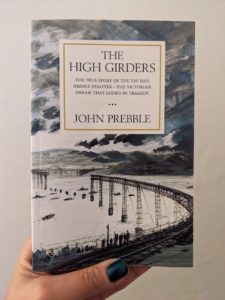The High Girders by John Prebble
Written by Ashley Kelmore, Posted in Reviews
Best for:
People interested in engineering disasters.
In a nutshell:
In the 1870s, the first of its kind bridge was erected across the Tay river firth to Dundee, in Scotland. 18 months after it opened, it collapsed during a severe windstorm, taking a train with 75 passengers and crew down with it.
Worth quoting:
“It was the Victorian age, and life and death had Purpose. There could be no disaster without a moral.”
Why I chose it:
I think I might have a new book goal: when I visit a city, go to the ‘local’ section and find a book written about whatever incident / disaster / historic event is most infamous in that city. Additionally, I had arrived in Dundee on a train running on the rebuilt bridge that runs parallel to the original collapsed bridge.
What it left me feeling:
Informed.
Review:
You know what’s kind of weird? Reading a book about the collapse of a rail bridge, while sitting on a train, running over the bridge that was built in place of that very collapsed bridge.
The Tay River Bridge was built in the 1870s. Before it was build, people coming up from Edinburgh would need to take a ferry across the Firth of Forth, then a train up to Newport, then ANOTHER ferry across to Dundee, and then a train the rest of the way. Civil engineer Thomas Bouch had an idea for a bridge to cross the First of Tay (and later the First of Forth), reducing the time it would take to make the trip up north dramatically.
Prebble manages to take what could be a pretty dry story – the lead-up to the disaster – and make it interesting. The prologue is just a couple of pages of the accident from the perspective of a rail employee who last saw the train before it started crossing the bridge. After that is Act 1, which focuses on how the bridge was built. There is corporate fighting between rail lines, there is government lobbying and back room deals. Then there are issues with the building of the bridge itself, including inaccurate surveying of the sea floor that misrepresented where the bedrock was. There’s unsurprisingly a couple of accidents, resulting in the deaths of 20 workers. Workers who, in 2023 pounds, were making about £5.56/hour ($6.86/hour) doing absolutely terrifying labor.
The entr’acte focuses on the 18 months when the bridge was open; specifically, on how some people stopped riding the train across because they were concerns about how quickly the trains were running. The original inspector said that trains should run at a maximum of 25 mph over the bridge; individuals believed it was being pushed to 40 mph.
The second act is about the disaster itself and the resulting inquest into who was at fault. I spent nearly 15 years in emergency preparedness and response, and disasters that take place in the 1800s are a different level of terrifying because there was just very limited technology. The train went into the Tay around 7:20 at night (it was December, so very dark this far north), and people didn’t really even realize it for many minutes. And there wasn’t a huge mobilization immediately to search for survivors – things took hours to get organized. Only one body was recovered in the first week; 25 of the 75 were never recovered. Identification of those whose remains were found was visual; distraught family members had to come and take a look at someone who had been in the river for more than a week. Leaders in the Scottish church blamed the victims because the rail was running on a Sunday, adding another level of devastation to grieving families.
This book was a very easy read, and would have a higher rating if not for the authors sexism and classism. The women were always described as sort of dim, or faint of heart, or looking to their husbands for guidance. He also described some as ‘dumpy,’ which, 1950s or not, what a random and unnecessarily cruel descriptor. In terms of the classism, the regard he held for the works who built the bridge seemed more about pity than respect.
Recommend to a Friend / Keep / Donate it / Toss it:
Donate it.


